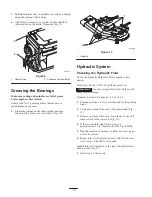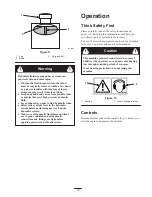
6
•
Follow the manufacturer’s recommendations for wheel
weights or counterweights to improve stability.
•
Use extra care with grass catchers or other
attachments. These can change the stability of the
machine.
•
Keep all movement on slopes slow and gradual. Do
not make sudden changes in speed or direction.
•
Avoid starting or stopping on a slope. If tires lose
traction, disengage the blades and proceed slowly
straight down the slope.
•
When operating machine on slopes, banks or near drop
offs, always have ROPS (roll over protection)
installed.
•
When operating a machine with ROPS (roll over
protection) always use seat belt.
•
Be certain that the seat belt can be released quickly if
the machine is driven or rolls into ponds or water.
•
Check carefully for overhead clearances (i.e. branches,
doorways, electrical wires) before driving under any
objects and do not contact them.
DO NOT
•
Do not mow slopes exceeding 15 degrees.
•
Avoid turning on slopes. If you must turn, turn slowly
and gradually downhill, if possible.
•
Do not mow near drop-offs, ditches, or embankments.
The machine could suddenly turn over if a wheel goes
over the edge of a cliff or ditch, or if an edge caves in.
•
Do not mow on wet grass. Reduced traction could
cause sliding.
•
Do not try to stabilize the machine by putting your
foot on the ground.
•
Do not use a grass catcher on steep slopes. Heavy
grass bags could cause loss of control or overturn the
machine.
Service
•
Never store the machine or fuel container inside where
there is an open flame, such as near a water heater or
furnace.
•
Keep nuts and bolts tight, especially the blade
attachment bolts. Keep equipment in good condition.
•
Never tamper with safety devices. Check safety
systems for proper operation before each use.
•
Use only genuine replacement parts to ensure that
original standards are maintained.
•
Check brake operation frequently. Adjust and service
as required.
•
Battery acid is poisonous and can cause burns. Avoid
contact with skin, eyes and clothing. Protect your face,
eyes and clothing when working with a battery.
•
Battery gases can explode. Keep cigarettes, sparks and
flames away from battery.
•
Hydraulic fluid escaping under pressure can penetrate
the skin and cause injury. Use cardboard or paper to
find hydraulic leaks. Never use your hands.







































